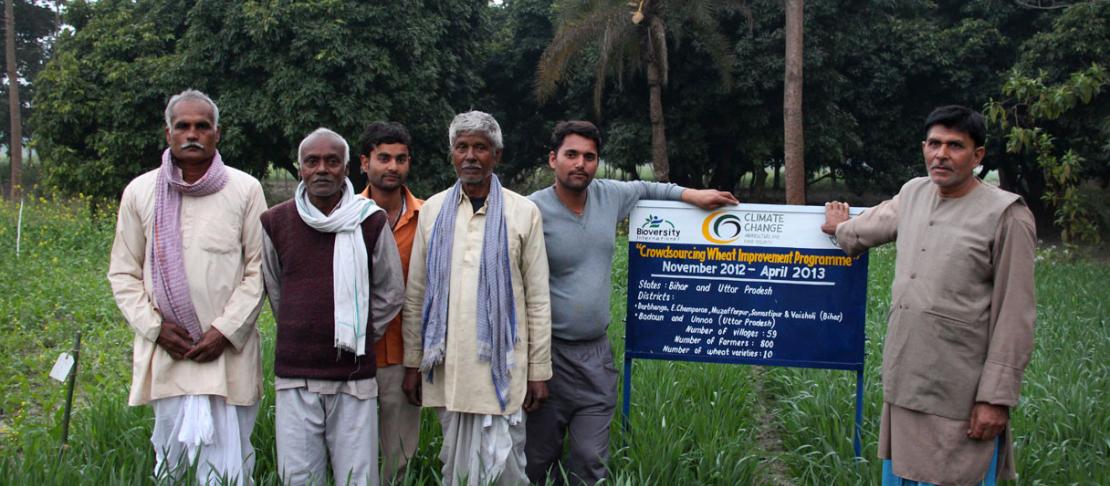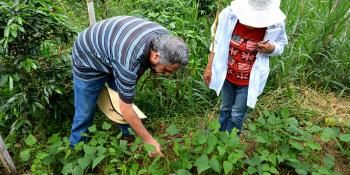Making ‘Citizen Scientists’ out of ‘Citizen Farmers’ in India

Through the ‘Seeds for Needs’ initiative, farmers are directly participating in the evaluation and selection of crop varieties, thereby reducing vulnerabilities through empowered decision-making.
In the discourse on climate change impact on agriculture, the need for diversification of crops gets recurrently highlighted. Weather and related biotic stresses due to the changing climate puts farmers, especially poor smallholder farmers, at high risks by impinging on productivity and incomes. Thus, a combination of different crop varieties/species/landraces not only proves to be the best insurance against such stresses, but also lends additional benefits such as improving soil fertility, supporting pollination, pest control, ensuring yield stability, while also contributing to food and nutritional security.
Extending access to information and inputs empowers farmers’ choices
The ‘Seeds for Needs’ initiative by Bioversity International, supported by CCAFS, is helping farmers become more resilient against climate induced vulnerabilities with a two-fold approach:
- Expose farmers to more crops and varieties to enhance their first-hand knowledge about different traits and options available
- Ensure farmers always have access to quality planting material that fits their changing needs
Transitioning from farmers to Citizen Scientists
It is the trials which are conducted to assess the suitability of different varieties in a particular location that help farmers transition from mere recipients to action takers. The trials encompass the Citizen Science approach that includes within itself crowdsourcing and Participatory Varietal Selection. Through the former approach, the farmers test the randomly assigned varieties that are provided, on their fields and compare them with their own varieties, henceforth, stating their preferred traits. Through the latter, the replicated trials of all the varieties get evaluated and statistically analysed to aid in selections. The onus here shifts remarkably to the farmers as they get to monitor and evaluate the crop varieties and become a vital node in the thread that leads to further decisions.
Welcoming dispersion of ‘Seeds for Needs’ in different states of India
It was in 2011 that the program started for two major crops, wheat and rice, in Vaishali district of Bihar, a Climate-Smart Village (CSV) site under CCAFS. The experiment began with a small group of 30 very sceptical farmers. Scepticism soon gave way to acknowledgement and compliance as the overwhelming results of the initiative increased the number of participating farmers to 5000 in the next 2 years, which now includes over 25000 farmers from 600 villages of 49 districts in 7 states.
What started in Bihar, where approximately 2500 farmers were trained in on-farm seed production, leading to farmers producing their own seeds for 7 rice varieties and 13 wheat varieties, has now culminated in 46000 participatory trials in different locations. Farmers have been exposed to 50 varieties of rice and wheat. A survey conducted in Bihar in April 2017, indicates that 83% of farmers in Samastipur, 95% in Chhapra and 95% in Vaishali who were initially hesitant or grew only 2 to 3 varieties, now know of more varieties of rice and wheat and agree on the need for crop diversification.
The program has scaled up to include farmers from eastern and western Uttar Pradesh, Odisha, Madhya Pradesh and Chhattisgarh. In Madhya Pradesh, seeds of 77 varieties of 22 crops have been distributed through the Seeds for Needs initiative. In fact, farmers are becoming open to experimentations such as in case of Satna, Madhya Pradesh, where 9 varieties of mustard were distributed to 1100 farmers during 2015-16 rabi season. Although the region is wheat dominant, the successful cultivation of mustard which requires less irrigation in a drought affected area, has visibly relieved the farmers.
As a Citizen Scientist, Jagdish Singh of Mukundpur village, Vaishali, Bihar says, “I assess all the varieties for use in the subsequent years”. Singh, who has been part of the Seeds for Needs initiative since 2011 earlier had to procure the seeds from the market where he could not find quality seeds. As a result of the success of the varieties especially in the face of a changing climate, he now says, “It is very important to try new varieties to counter the climate change we are experiencing in our area”.
Read more:
Neeraj Sharma is a Scientist (Crop Diversification and Seed Systems) at Bioversity International, South and Central Asia
Arnab Gupta is a Scientist (Agroecology and seed Systems) at Bioversity International, South and Central Asia
N K Krishna Kumar is the Regional Representative for South and Central Asia at Bioversity International
Sonal Dsouza is the Communication and Program Assistant at Bioversity International, South and Central Asia
Shehnab Sahin is the Communications Specialist at CCAFS South Asia



